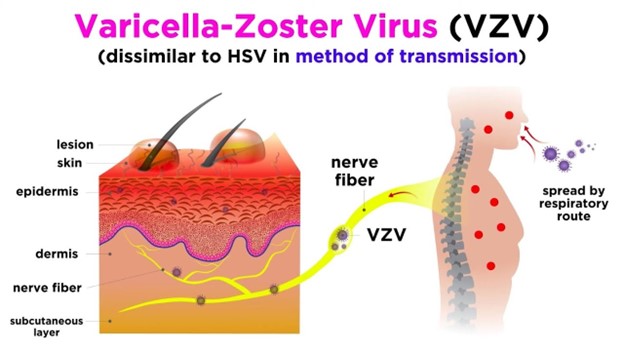A nurse is assisting with the admission of a client who has varicella zoster.
Which of the following interventions should the nurse plan to implement?
Assign the client to a negative pressure airflow room
Have visitors remain at least 0.91 m (3 feet) away from the client
Initiate contact precautions for the client
Administer aspirin if the client develops a fever
Correct Answer : A,C
Varicella zoster is highly contagious, and airborne precautions should be implemented. Assigning the client to a negative pressure airflow room helps prevent the spread of the virus to others by containing and filtering the air within the room.
In addition to airborne precautions, contact precautions should also be implemented. This includes using gloves and gowns when providing care to the client to minimize direct contact with infectious materials.

The other options listed are not appropriate interventions for a client with varicella zoster: While it is important to minimize close contact with an infectious client, varicella zoster is primarily transmitted through airborne droplets. Visitors should follow the appropriate precautions, such as wearing masks and adhering to hand hygiene, rather than just maintaining a certain distance.
Aspirin should not be given to clients with varicella zoster, especially children, due to the risk of developing Reye's syndrome. Reye's syndrome is a rare but serious condition that can cause swelling in the liver and brain. Acetaminophen (paracetamol) is typically recommended for managing fever in clients with varicella zoster.
Nursing Test Bank
Naxlex Comprehensive Predictor Exams
Related Questions
Correct Answer is C
Explanation
For a client with a prepregnancy BMI of 30.5, the acceptable weight gain during pregnancy would be around 11 to 20 pounds (5 to 9 kilograms) according to the guidelines set by the Institute of Medicine (IOM).
Correct Answer is A
Explanation
This statement accurately reflects the client's own account of what happened, providing important information about the circumstances leading to the fall. Including the client's statement helps document the client's perspective and can contribute to a more comprehensive understanding of the event.
"The client fell because the assistive personnel did not place nonskid slippers on the client." This statement assigns blame to the assistive personnel without sufficient evidence. It is important to maintain objectivity and avoid making assumptions or assigning fault without proper investigation or documentation of facts.
"The client does not appear to have any injuries resulting from the fall." While it is important to assess the client for any injuries after a fall, documenting this information may be more appropriate in the client's assessment or nursing notes rather than in the specific documentation about the fall incident itself.
"An incident report has been completed and sent to risk management." While it is important to report falls and complete an incident report for quality improvement and risk management purposes, this information is more relevant to internal documentation and reporting processes rather than inclusion in the medical record for the client's care.
Whether you are a student looking to ace your exams or a practicing nurse seeking to enhance your expertise , our nursing education contents will empower you with the confidence and competence to make a difference in the lives of patients and become a respected leader in the healthcare field.
Visit Naxlex, invest in your future and unlock endless possibilities with our unparalleled nursing education contents today
Report Wrong Answer on the Current Question
Do you disagree with the answer? If yes, what is your expected answer? Explain.
Kindly be descriptive with the issue you are facing.
